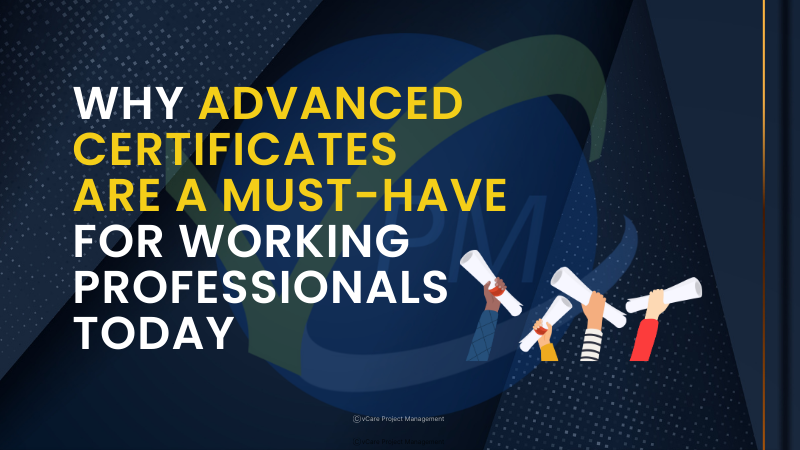

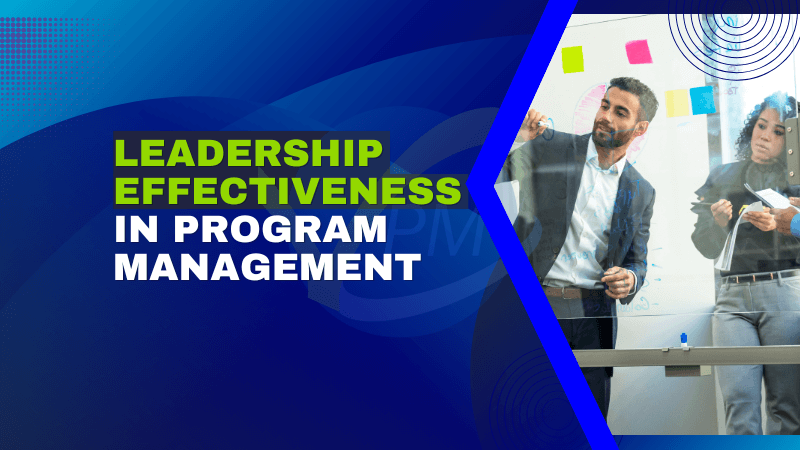
Leadership effectiveness in program management
Managers who practice both strong management and effective leadership skills are successful project managers. Management skills are different from leadership skills. Effective leaders develop new leadership skills to enhance the ones that help them succeed as managers.
Organizations require effective leaders to achieve their strategic goals through programs and initiatives. Therefore, organizations need successful project/program managers who are also effective leaders. But what kind of leadership skills do project managers require? Are project management skills insufficient?
Project management differs from leadership. However, although project management differs from leadership, the two have some similarities. For instance, the performance of a project manager and the leader’s efficacy are both judged in terms of the performance of the followers—the team’s performance. As a result, focusing on team performance is a critical component of building project managers’ leadership skills.
Leadership Effectiveness

Leadership Effectiveness & Program management
On a macro level, leadership effectiveness is defined by a leader’s ability to gain support and influence throughout an organization to guarantee that everyone is going in the same direction to achieve common goals. It effectively measures a leader’s ability to lead, influence, manage, advice, and build their team members. The total growth and performance of the teams may be used to assess leadership effectiveness. Those who report high levels of productivity, performance, employee happiness, and well-being indicate high levels of leadership effectiveness.
A good leader inspires the best in others. These leaders understand how to create the ideal corporate vision, establish the proper values, and assist employees in focusing on and improving their skills. Great leadership reflects great performance, not just complex numbers. Workers and the organization will improve if leaders establish a great corporate culture and help employees thrive.
Program management
According to the Standard of Program Management – Fourth Edition, Program management is “the application of knowledge, skills, and principles to a program to achieve the program objectives and to obtain benefits and control not available by managing program components individually.” Program management involves aligning program components to ensure goals are achieved and benefits are optimally delivered. Program management is performed by a program manager authorized by the organization to lead the team(s) responsible for achieving program goals and objectives.
Ways to improve leadership effectiveness in Program Management

Ways to improve leadership effectiveness in Program Management
- Ensure clarity and visibility of goals
You may begin your path to improve leadership effectiveness in your business by encouraging leaders, managers, and executives to focus on objective clarity and visibility. This move has multiple aspects. First and foremost, the goals must be very clear. As a result, goals must be SMART for effective leadership, and adopting an OKR approach will make sense.
Second, for comprehensive visibility, the goals must be communicated to everybody. On the one hand, everyone in the team has to understand the organization’s goals and their role in attaining them.
- Facilitate accountability and responsibility
Second, exercising accountability and responsibility is critical for leadership success. Encourage your leaders to take accountability for their actions. The goal is to encourage them to be interested in increasing their leadership effectiveness. This aspect requires determining which skills and abilities to be acquired, as well as aspects such as emotional intelligence and empathy. When your leaders seek to improve themselves, they usually set a good example for others to follow, increasing their effectiveness as leaders since they may start a positive trend.
- Create a culture of feedback
Leadership effectiveness is heavily influenced by a leader’s desire to improve oneself. It is optional to self-assess the deficiencies and work on upskilling in this situation. Instead, it is critical to foster a feedback culture. First and foremost, it is vital to provide feedback to employees on their performance and to assist them in improving and growing along the way. This move will immediately influence organizational goals and define increased effectiveness.
Second, encourage your leaders to be receptive to employee input as well which will assist them in seeing and comprehending the gaps in their leadership style that may impede their success as a leader. Creating a feedback culture can promote improved outcomes, eventually enhancing leadership effectiveness.
- Build trust and transparency
Trust and openness are required for leaders to influence, direct, and build their teams to success. When employees trust their supervisors or leaders, they will follow them fully and offer their all. If not, following their manager will be a pointless exercise limiting leadership effectiveness.
Similarly, it is critical to be open and honest with all employees. Secrets, nepotism, preferences, and biases will be self-defeating if you want your leaders to inspire everyone collectively. Instead, everyone must be treated equitably, and all processes must be transparent to acquire team trust and influence them.
- Focus on continuous performance management
Effective leadership is not just about motivating and encouraging team members to follow a leader or manager but also about doing so in a way that leads to achieving a certain objective or high level of performance. As a result, boosting leadership effectiveness necessitates emphasizing continuous performance management.
Employees grow and develop when their leaders or managers regularly monitor and track employee performance and give frequent interventions and corrective steps to minimize risks or problems. As a result, they can motivate and inspire their team members, resulting in increased leadership effectiveness.
- Respect differences and promote inclusion
Members of each team come from various backgrounds, bringing with them different perspectives, ideas, and opinions. An effective leader accepts these differences, appreciates them, and recognizes their value. To boost leadership effectiveness, you must cultivate an inclusive culture. In addition, your leaders must understand the important skills and competencies each team member brings to the table and how the multiple views and perspectives offer the ideal breeding environment for creativity and success, resulting in leadership effectiveness.
- Foster a growth mindset
The last recommended practice for increasing leadership effectiveness is cultivating a growth mindset. It would be best to encourage your leaders to have a growth mindset during all interactions or choices they make. For example, when dealing with a team member, they must keep the employee’s personal and professional development in mind. Likewise, when making a strategic choice, they must link it with the organization’s goals and how it will eventually contribute to its success. With a development mentality, your leaders will guarantee that they lead effectively, strategically, and in the greatest way possible.
Leadership in Project Management
Leadership in project management is a vital ability for completing the project effectively. Leadership in a project setting, like leadership in other areas of business, necessitates demonstrating many talents and behaviors. Leadership is essential to ensure your initiatives’ success, from team direction to project governance.
Leadership and project management go hand in hand. You oversee the project and lead the team as the project lead. Setting the vision and encouraging the team to work together to accomplish it is a vital component of leadership. You can see how significant that is in a project environment. Delivering any project requires a team effort. While some teams work without a clear leader, in today’s business, it is more customary for someone to be in the leadership role, guiding and directing the team toward their goals.
5 Essential Project Leadership Skills
Influential leaders draw on many essential project management skills and competencies. The top five project management leadership skills are:

5 Essential Project Leadership Skills
- Communication
One of the essential project management characteristics is communication skills. Communication skills are essential for project leaders since their job requires collaboration. You can only collaborate efficiently if you can communicate clearly. Leaders can communicate ideas to people and groups in person, over the phone, or through other modes of communication. Therefore, communication is one of the most important abilities of a program manager, especially in a leadership role.
- Team leadership
The leader establishes the vision. They motivate others around them. Someone with outstanding project leadership skills fosters team agreement and togetherness while managing day-to-day team activities.
Team leadership on projects entails establishing an atmosphere in which everyone may thrive. People are drawn to the project culture that surrounds them. Stakeholders want to participate in the project because they know you will complete the task while creating a pleasant working environment.
- Motivation
Leaders inspire people to act even when they are not technically in control. As a program manager, you figure out what makes the other team members feel like they’re doing their best, and you do your best to deliver it to them.
Everyone is driven differently, and a person’s motivation can shift over time. Great leaders realize these distinctions and enable their employees to accomplish their best by fostering a happy work environment.
- Crafting solutions
Empowering the team and the larger stakeholder community to participate in developing solutions is part of fostering a positive working culture. That entails removing obstacles so each team member may fulfill their work and contribute new ideas without worrying about something getting in the way. Empowering leaders will also drive decisions down the hierarchy to the lowest possible level, allowing specialists to judge the solutions required to keep the project going.
- Conflict resolution
Conflict is inevitable when introducing or altering anything. However, effective leaders understand how to use conflict for good since the finest solutions emerge when ideas are challenged.
Conflict may benefit teams because it allows all voices to be heard and opposing viewpoints to be expressed, frequently leading to a better solution and more effective project outcomes. However, leaders must be prepared with conflict resolution tactics to recognize and address conflict before it becomes a problem for the team.
The Challenges of Leadership Effectiveness

The Challenges of Leadership Effectiveness
- Development of managerial effectiveness
To improve their leadership effectiveness, project leaders must acquire the following skills:
- Time management
- Task prioritization
- Strategic thinking
- Goal-setting ability
- Good judgment
These are essential skills for a project leader to deliver effective projects and handle the possibly competing demands of many duties. Without them, a leader is more prone to burnout from focusing on irrelevant matters and achieving little of the planned tasks and objectives.
- Inspiring and Motivating the Workforce
Motivating and inspiring others to follow you and act in a specific manner is a skill that some people appear to be born with, and others must learn. However, whether you have an inherent talent for motivating others or not, it is a skill that every project leader must have to motivate their worldwide workforce.
Passion is an important aspect of inspiring and encouraging people. Passionate leaders ignite the fire in their team members, allowing innovation to flourish and encouraging everyone to participate. In addition, effective leaders can naturally share and correctly convey their team’s and stakeholders’ enthusiasm and drive.
- Developing Employees and the Rise of “Servant Leadership.”
“Servant leadership” is based on the idea that leaders should not just delegate responsibilities but also consider themselves servants of the people they manage. As a result, their actions are driven by what is best for their team or workers rather than by what is best for themselves, which might manifest itself in the following ways:
- Close collaboration between management structures and employees
- Active participation in the growth of their teams
- Leading by example and embodying the ideals that leaders want to see in their team dynamics
- Using value systems to motivate teams to act rather than spreading fear
- This managerial style is infused with sincerity and humility.
A project leader who can find a balance between the servant-leader management style and more antiquated, authoritarian methods will be able to inspire and encourage their workforce.
- Leading a Team
All diverse cultures and viewpoints must cooperate and contribute to leading a project team effectively. Whether forming a new team or taking over an existing one, leaders must be able to give the support their team requires to cope with and navigate change or to create something entirely new.
Determining the sort of assistance required might take time and effort. Teams are as distinct as the individuals that comprise them. Project leaders must be extremely attentive to detect the demands of their workforce. What works for one person may not work for another. Leaders must be able to modify their management style in response to the demands of their teams.
Final Thoughts
In today’s firms, competent project managers must also be effective leaders. Therefore, successful project managers may use their inventive and creative skills to assist them in acquiring leadership skills that will complement their project management skills by recognizing the difference between project management and leadership and adopting the roadmap to becoming effective leaders.
The shared component of project management and leadership is the yardstick by which the performance of the project manager and the leader is measured. The performance of a project manager and the efficacy of a leader are both judged in terms of the performance of the followers, i.e., the team’s performance.
As a result, improving leadership skills for project managers with an emphasis on skills to increase team performance should be an essential factor in the project management leadership skill development process. Project managers’ essential leadership skills begin with motivating and inspiring teams and individuals. These aspects can be developed via negotiation and communication, listening and influencing, and team-building skills, emphasizing leveraging these talents to improve overall team performance.
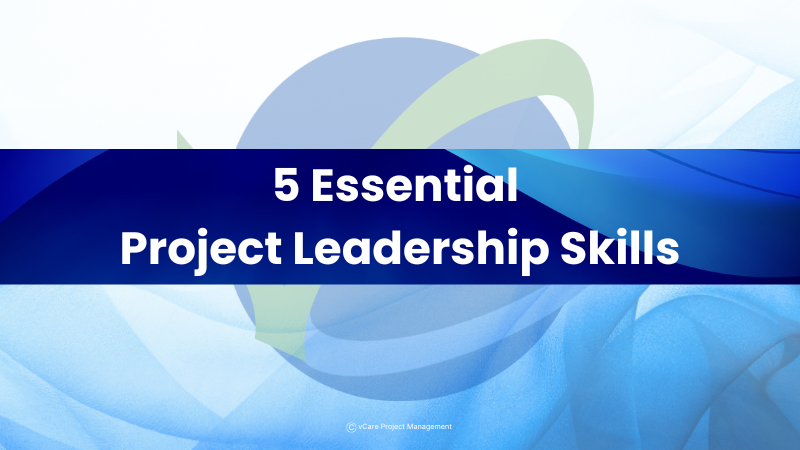
Top 5 Essential Project Leadership Skills | vCare Project Management | Dharam Singh | PMBOK | PMP | PMI
5 Essential Project Leadership Skills | vCare Project Management
Influential leaders draw on many essential project management skills and competencies. The top five project management leadership skills are:
– Communication
– Team leadership
– Motivation
– Crafting solutions
– Conflict resolution
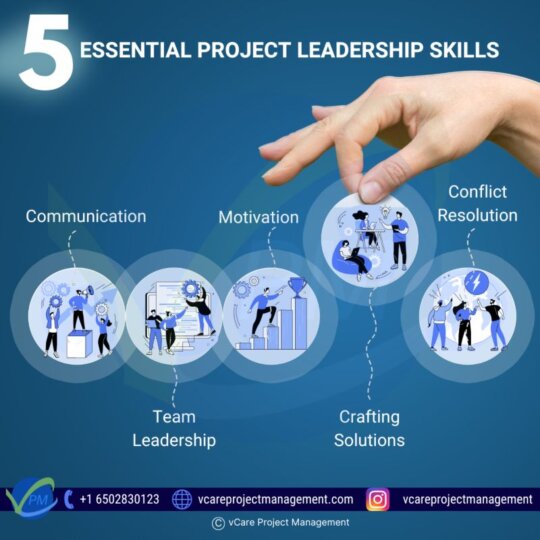
Enhance your project leadership skills! Learn the top 5 essential competencies for project success.
View our upcoming physical bootcamps in Rome, Dubai and Riyadh
PfMP Rome Bootcamp: May 10-12: https://bit.ly/3RJSGd1
PgMP Dubai Bootcamp: May 14-16: http://bit.ly/3j7NPnq
PfMP Dubai Bootcamp: May 17-19: https://bit.ly/3v0figp
PgMP Riyadh Bootcamp: May 21-23: http://bit.ly/3WWSwyx
PfMP Riyadh Bootcamp: May 24-26: http://bit.ly/3IdfayJ
View our upcoming Direct Classroom Sessions
PgMP®- http://bit.ly/2oCfpg0
PfMP® – http://bit.ly/38er2M3
PMP® – http://bit.ly/3ic7GRF
View our upcoming Online Mentoring Programs
PgMP® – http://bit.ly/2oBKQXQ
PfMP® – http://bit.ly/39jOZSf
PMP® – https://bit.ly/2BU0mFp
Join our LinkedIn Groups for the latest updates
PgMP4U – http://bit.ly/2SBPwIp
PfMP4U – http://bit.ly/31P7GKR
PMP4U – https://bit.ly/30gV5QX
Check the various offers and discounts we offer at https://bit.ly/3jWVepD
For any questions related to Project Management career, training, and certifications, you can book an obligation free 15 minutes session with leading PMP, PgMP & PfMP Mentor Dharam Singh, PgMP, PfMP, PMP, RMP, SP,ACP,PBA,DASM,DASSM by visiting talktodharam.com
You can subscribe to vCare Project Management YouTube Channel to catch future videos of our Q&A series and certification success stories: https://bit.ly/2YF0wJl
You can subscribe and follow Dharam podcasts and interviews with Project Management Experts on YouTube at https://bit.ly/2NDY8wd
#ProjectLeadership #ProjectManagement #LeadershipSkills #CommunicationSkills #TeamLeadership #ProjectSuccess #ConflictResolution #vCareProjectManagement #AskDharam #DharamSingh

Project leadership qualities and competencies | vCare Project Management
Project leadership qualities and competencies
When the project requires success, both project managers and project sponsors should take up the role of a project leader by demonstrating leadership talents, competencies, and entrepreneurial mindsets. The following are the most significant features of effective project Leadership:

Project leadership qualities and competencies
– Project management technical skills

Project management technical skills
– Product development and domain expertise

Product development and domain expertise
– Strategy and business acumen

Strategy and business acumen
– Leadership and change management skills

Leadership and change management skills
– Agility and adaptability

Agility and adaptability
– Ethics and values

Ethics and values
Follow us on,
LinkedIn – https://bit.ly/2ZmYnSL
Facebook- https://bit.ly/2QQ5u18
Instagram- https://bit.ly/3lR4ibZ
Pinterest- https://bit.ly/31XzbUz
YouTube – https://bit.ly/2YF0wJl

vCare Project Management
View our upcoming Direct Classroom Sessions
PgMP®- http://bit.ly/2oCfpg0
PfMP® – http://bit.ly/38er2M3
PMP® – http://bit.ly/3ic7GRF
View our upcoming Online Mentoring Programs
PgMP® – http://bit.ly/2oBKQXQ
PfMP® – http://bit.ly/39jOZSf
PMP® – https://bit.ly/2BU0mFp
Join our LinkedIn Groups for the latest updates
PgMP4U – http://bit.ly/2SBPwIp
PfMP4U – http://bit.ly/31P7GKR
PMP4U – https://bit.ly/30gV5QX
Check the various offers and discounts we offer at https://bit.ly/3jWVepD
For any questions related to Project Management career, training, and certifications, you can book an obligation free 15 minutes session with leading PgMP & PfMP Mentor Dharam Singh by visiting talktodharam.com
You can subscribe to vCare Project Management YouTube Channel to catch future videos of our Q&A series and certification success stories: https://bit.ly/2YF0wJl
You can subscribe and follow Dharam podcasts and interviews with Project Management Experts on YouTube at https://bit.ly/2NDY8wd
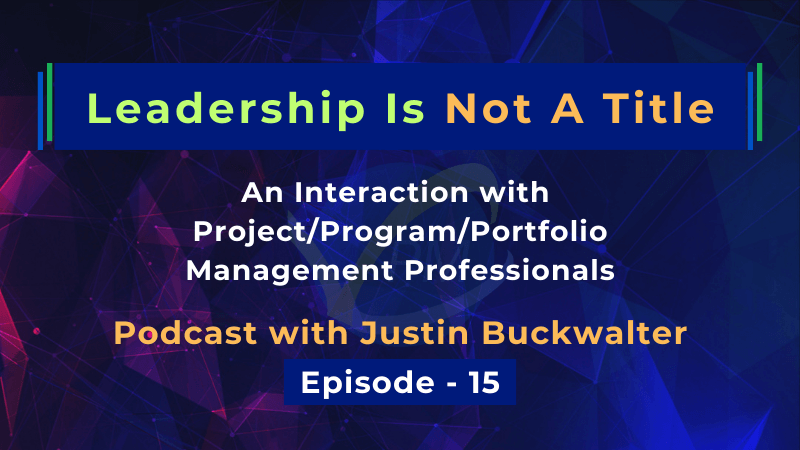
Leadership Is Not A Title
Leadership Is Not A Title | Justin Buckwalter | Dharam Singh | Episode 15
Video Link: https://youtu.be/mQIrEu_Qo34
Participants:
– Justin Buckwalter, PfMP, PgMP, PMP, PMI-ACP, PMI-RMP
– Dharam Singh, PgMP, PfMP, PMP, RMP, SP,ACP,PBA,DASM,DASSM
The following topics have been discussed in brief:
– What key traits or attributes distinguish a true leader, regardless of their official title or organizational role?
– Why must organizations recognize and encourage leadership at all levels rather than solely relying on those in formal leadership roles?
– How can understanding “Leadership SWOT Analysis” assist you in developing realistic and attainable leadership development goals?
– How do you handle conflicts or challenges that arise from being a leader and a manager? Can you share your experiences?
– How do you promote a positive, inclusive work environment where diverse perspectives and ideas are welcomed and encouraged?
– How can leadership be used positively to motivate and inspire project team members to perform at their best? Conversely, how can misuse of power lead to demotivation and disengagement?
– Can you provide instances where individuals, who weren’t in leadership positions, initiated positive change and influenced their teams or communities through their actions alone?
Check the various offers and discounts we offer at https://bit.ly/3jWVepD
For any questions related to Project Management career, training, and certifications, you can book an obligation free 15 minutes session with leading PgMP & PfMP Mentor Dharam Singh, PgMP, PfMP, PMP, RMP, SP,ACP,PBA,DASM,DASSM by visiting http://talktodharam.com
Subscribe to vCare Project Management YouTube Channel to catch future videos of our Q&A series and certification success stories: https://bit.ly/2YF0wJl
Subscribe and follow Dharam Singh Podcasts and interviews with Project Management Experts on YouTube at https://bit.ly/2NDY8wd
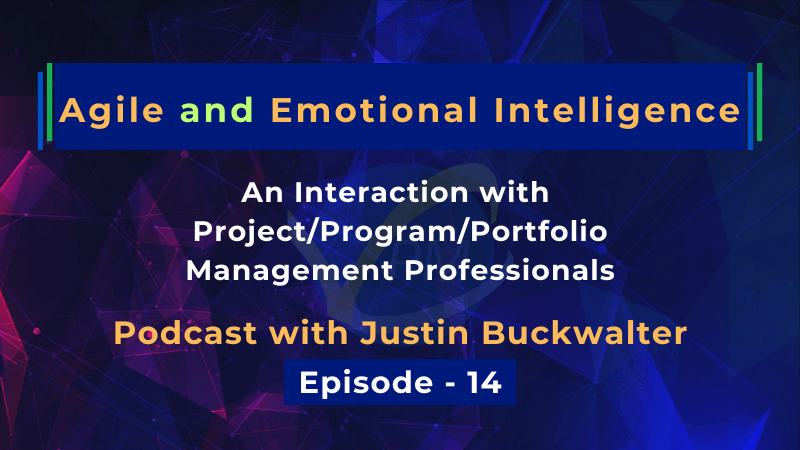
Agile and Emotional Intelligence
Agile and Emotional Intelligence | Justin Buckwalter | Dharam Singh | Episode 14
Participants:
– Justin Buckwalter, PfMP, PgMP, PMP, PMI-ACP, PMI-RMP
– Dharam Singh, PgMP, PfMP, PMP, RMP, SP,ACP,PBA,DASM,DASSM
The following topics have been discussed in brief:
· How can Agile principles and practices be leveraged to enhance emotional intelligence in individuals and teams?
· How does emotional intelligence impact decision-making within Agile teams?
· What are the challenges or potential conflicts may arise when incorporating Emotional Intelligence into Agile teams, and how can they be addressed?
· How can emotional agility positively impact relationships and communication at work and personal life?
· What are the key components and characteristics of Emotional Intelligence? How can individuals effectively develop and cultivate these elements to enhance emotional intelligence?
· How can Project Managers utilize emotional intelligence to enhance their leadership abilities and cultivate more productive relationships?
Check the various offers and discounts we offer at https://bit.ly/3jWVepD
For any questions related to Project Management career, training, and certifications, you can book an obligation free 15 minutes session with leading PgMP & PfMP Mentor Dharam Singh, PgMP, PfMP, PMP, RMP, SP,ACP,PBA,DASM,DASSM, by visiting https://bit.ly/2SbhTOK
Subscribe to vCare Project Management YouTube Channel to catch future videos of our Q&A series and certification success stories: https://bit.ly/2YF0wJl
Subscribe and follow Dharam Singh Podcasts and interviews with Project Management Experts on YouTube at https://bit.ly/2NDY8wd



Enhance your professional journey with Advanced Certifications:
– Become an Expert/Master of the art
– Earn the birds – eye view
– ‘’Doing the work right’’ to ‘’Doing the right work’’
– Gain global recognition
– When all is equal, the certified gets hired
– Be that Differentiator
– Eliminate career shocks
View our Online Mentoring Programs
PgMP – http://bit.ly/2oBKQXQ
PfMP – http://bit.ly/39jOZSf
PMP – https://bit.ly/2BU0mFp
Agile – https://bit.ly/3ogQY0N
RMP – https://bit.ly/4bqgTws
PBA – https://bit.ly/453ObyV
SP – https://bit.ly/3z4Z47C
Check the various offers and discounts we offer at https://bit.ly/3jWVepD
For any questions related to Project Management career, training, and certifications, you can book an obligation free 15 minutes session with leading PMP, PgMP & PfMP Mentor Dharam Singh PgMP, PfMP, PMP, RMP, SP,ACP,PBA,DASM,DASSM, PMI-ATP by visiting talktodharam.com
You can subscribe to vCare Project Management YouTube Channel to catch future videos of our Q&A series and certification success stories: https://bit.ly/2YF0wJl
You can subscribe and follow Dharam podcasts and interviews with Project Management Experts on YouTube at https://bit.ly/2NDY8wd
#AdvancedCertifications #CareerDevelopment #ProfessionalGrowth #PMICertification #CareerAdvancement #Upskilling #CertificationGoals #SkillEnhancement #StrategicThinking #GlobalRecognition #CareerResilience #ElevateYourself #ProjectManagement #AskDharam #DharamSingh #DharamSinghPgMP #DharamSinghPfMP #DharamSinghPMP #vCareProjectManagement